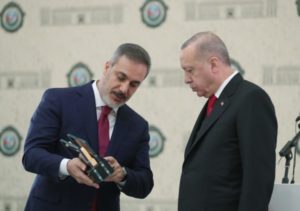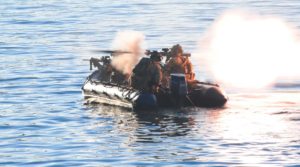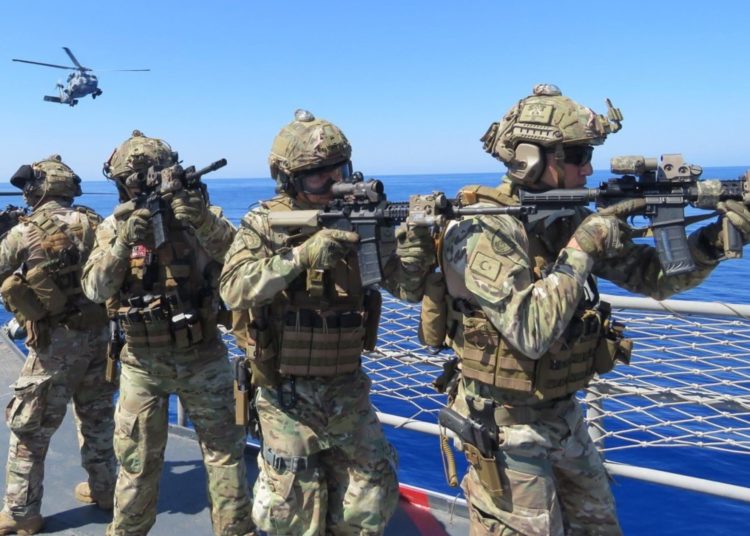Abdullah Bozkurt/Stockholm
The Turkish president, who in recent months has repeatedly threatened an invasion of Greek islands in the Aegean Sea, plans to deploy a secretive, specially trained unit attached to intelligence agency MIT to escalate tensions with Greece, a NATO ally and neighbor.
The MIT unit, the existence of which has never been publicly admitted, is a relatively new tool in the arsenal of Turkey’s intelligence agency and will be put to use for the first time in setting up a clandestine, military-style operation against a Western country.
The plot includes several options, ranging from sabotage in Greek islands close to the Turkish mainland to raising a Turkish flag on one or several uninhabited islets and rock formations as well as conducting a false flag operation to justify a Turkish response. Turkish President Recep Tayyip Erdoğan is still considering the alternatives submitted to him by his confidant, Hakan Fidan, the head of MIT, and has not yet decided which course of action he wants to take.
According to information obtained by Nordic Monitor from sources familiar with the plot, it will be up to this special unit created within the intelligence agency to carry out the operation in the Aegean Sea with logistical support from the Turkish military’s air and naval assets. The plot, kept strictly confidential on a need-to-know basis within Erdoğan and Fidan’s close circle, will be put into motion sometime near the general election in 2023 to rally the nation behind Erdoğan and bring a windfall vote for his ruling Justice and Development Party (AKP) and its nationalist allies.
For decades, MIT had no military-type operational capability, and its mandate had been mainly confined to information gathering operations to provide the best intelligence to policymakers in Turkey.
When MIT needed muscle on the ground, it used to rely on several elite units in the military such as Combat Search and Rescue (Muharebe Arama Kurtarma, or MAK), a part of the Special Forces Command (Özel Özel Kuvvetler Komutanlığı); the Turkish navy’s Underwater Offense (Su Altı Taarruz, or SAT), the equivalent of the US Marines; and Underwater Defense (Sualtı Savunma, or SAS). Occasionally the police department’s Special Operations Police Force (Özel Harekat Polis) was also tapped by the intelligence agency to conduct domestic operations.
That started to change when Fidan, a hard-core pro-Iran Islamist who had no experience in intelligence, was appointed to lead the agency in May 2010. Fidan set out to transform the agency in line with instructions from his boss, transferring new people from other government agencies and at times recruiting some from the outside, especially from Islamist groups.
Fidan, who admires Iran’s mullah regime and was groomed in Shiite study circles when he was a young noncommissioned officer in Ankara, wanted to create a Turkish version of the Quds Force within the agency. He instructed his newly recruited staff to make that happen.
In the meantime, he also launched a purge of hundreds of agents from MIT on fabricated charges to make room for the new recruits, intimidate his critics within the agency and suppress dissent in the rank and file.
One of the key recruitments Fidan made happen once he took over the reins of MIT was the transfer of 57-year-old former soldier Kemal Eskintan, who had some intelligence experience. Eskintan served as a project officer when he was a major between July 2006 and June 2007 in the General Staff Directorate for Counter-intelligence and Security.
General Staff document that shows Kemal Eskintan worked as a project officer in the intelligence section of the military:
Eskintan was initially assigned to the department responsible for providing protective services to high-value people. In 2014 he was put in charge of the Department for Special Operations (Özel Faaliyetler Dairesi). The first critical operation conducted by Eskintan was to train and equip jihadist groups in Syria. Known by his nom-de-guerre Abu Furqan, Eskintan unleashed thousands of armed jihadists in Syria, many with links to al-Qaeda and the Islamic State in Iraq and Syria (ISIS).
When Turkey worked with the US on a train-and-equip program until 2016 for what was advertised as support for the moderate opposition in Syria, the names and groups identified as candidates by Eskintan for enrollment in the program came mostly from al-Qaeda and ISIS-linked groups. It is not surprising that the CIA rejected many of them during screening of the candidates submitted by Turkey.
The second critical role played by Eskintan was during a false flag coup attempt in July 2016, which was orchestrated to create a pretext for a mass purge of the Turkish military, including the ouster of two-thirds of all flag officers, as well as to launch a military operation in Syria, help Erdoğan become president with no checks on his powers and stifle dissent and opposition in Turkey.
Eskintan brought several jihadist groups to Turkey in preparation for the false flag and positioned them in Istanbul and several other key cities with a view to causing bloodshed in the streets. In fact, some of the people who were involved in the lynching of unarmed cadets who had been ordered to participate in a drill and training exercise and to guard the Bosporus Bridge under the pretext of protection against a terrorist attack were Eskintan’s jihadists.

After victims’ families filed criminal complaints, prosecutors set out to investigate the lynching of the cadets but were quickly stopped by the Erdoğan government’s hastily drafted decree-law that provided blanket immunity for civilians who participated anti-coup events on July 15 and 16. All investigations to identify the perpetrators of the lynchings were subsequently dropped.
Despite repeated motions filed by defense lawyers in coup trials to bring Eskintan and his aide, Kadir Sazoğlu, a former sergeant in the army, to the witness stand for cross examination to find out what roles they had played during the coup were rejected by judges under a government directive. No explanation was provided by the courts for their refusal to issue summons for them to appear in the court.
When Turkey was involved in Libya and sent Syrian jihadists to fight there, it was Eskintan who had carried out the clandestine operation on behalf of the intelligence agency. He made repeated trips to there to oversee operations.
Since 2016 Eskintan has also been involved in cross-border operations to kidnap Erdoğan critics and opponents in Turkey and among diaspora groups in order to sustain a climate of fear, and in the intimidation of critical journalists who are still exposing the wrongdoings of the Erdoğan government under challenging circumstances from exile.
Now he is in charge of the false flag operation against Greece to deliberately stoke tensions in order to serve his boss. He will rely on this secretive unit groomed within the intelligence agency under his stewardship in order to make that happen once the final go-ahead is given by President Erdoğan.
The idea of developing a stand-alone special forces unit within MIT was fleshed out by Eskintan starting in 2012 in line with Fidan’s ambitions to carry out clandestine cross-border operations. Instead of relying on similar units that already exist in the military and police, Fidan wanted a free hand and did not want to face the limitations the agency encountered when using the special forces of the Turkish military and police department, which have their own sets of rules and are relatively accountable to the public and the judiciary, as opposed to MIT, which enjoys carte blanche immunity thanks to legislation pushed through parliament by Erdoğan.

In order to build the special forces, MIT approached several high-ranking officers within the Special Forces Command (Özel Kuvvetler Komutanlığı, ÖKK) in 2013 for recruitment as well as ÖKK retirees. The candidates were offered higher pay, more benefits and more importantly immunity from prosecution if they were exposed. Lt. Gen. Zekai Aksakallı, the commander of ÖKK who forged close ties with MIT, encouraged the transfers.
MIT also started putting its own agents through ÖKK training, especially for engaging in sabotage, raids, entrapment, destruction, infiltration and false flag operations as part of a course officially titled “Unconventional Operations” (Konvansiyonel Olmayan Harp, or KOH). Brig. Gen. Semih Terzi, the number two in ÖKK, was not happy with MIT’s underhanded dealings, especially in Syria and Iraq, and was staunchly opposed to MIT’s illegal activities.
Terzi was assassinated in July 2016 by a secret plot concocted by MIT and falsely branded as a putschist to cover the tracks that led to his murder. When his wife started digging around to learn more about the assassination, she was thrown in jail to silence the family from ever revealing what her husband found out about MIT’s unlawful activities in Syria and how Aksakallı personally profited from conflict and arms sales.
With no opposition left to gut the military’s ÖKK, Eskintan intensified his efforts to boost MIT’s own special forces unit. In recent years, the secret MIT operations carried out in Syria and Iraq to assassinate and capture senior figures of the Kurdistan Workers’ Party (PKK) and its Syrian offshoots were conducted by this special forces unit. MIT often leaks these operations to the media in order to promote the agency in public and build political capital against competitors in the police and military units.
Now the same unit is prepared to strike Greek assets, not to advance Turkey’s strategic objectives or address urgent national security concerns, but rather to promote an embattled Erdoğan in advance of the general election amid the mounting financial difficulties voters are facing in their daily lives. If and when that happens, the public discussion will move beyond bread-and-butter debates to conflict with Greece, and Erdoğan hopes to ride out the critical elections amid a heightened nationalist euphoria.












